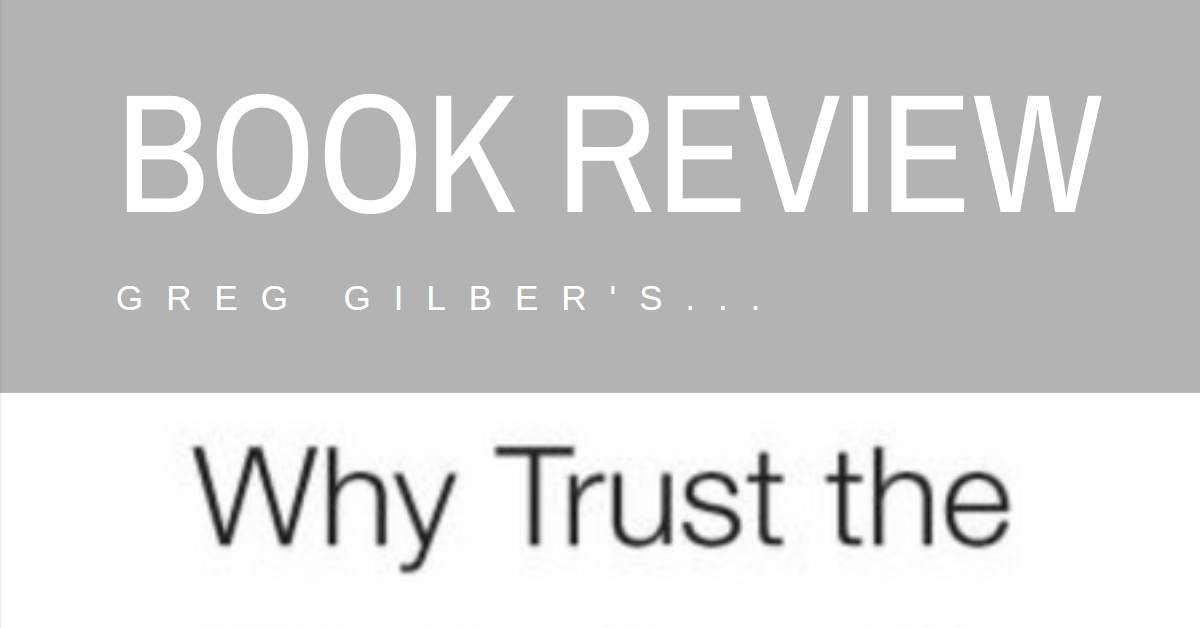One of the many benefits of following IX Marks ministries is that you become aware of so many little, short books packed with big Bible blessings.
Of my recent reads, Greg Gilbert’s “Why Trust the Bible?” is one of those compact books that packs a punch. Mr. Gilbert’s book aims directly at the pop-culture misconception that the Bible is a primarily folklore book. While unashamedly admitting himself to be a Christian in the intro, Gilbert manages to also appear to have the ability to sympathize with common critics of Scripture from non-believers. While not defending their skepticism, he seems to have a deft ability to place himself in their shoes before critiquing their critique of the Word.
Here are five of my personal insights from Greg Gilbert’s 100+ page assault on our cultures incorrect assumption of the Holy Scriptures.
Jesus Believed the Scriptures
Gilbert starts his compelling book with a very simple but sharp argument “Jesus believed the Old Testament Scriptures.” This assertion, while seemingly common sense, is at its source all the authority and argument a Christian would ever need. Gilbert immediately alludes to the real question for those seeking the authenticity of the Bible. The question for Christians and non-Christians shouldn’t be “can we trust the Bible” but should be “can we trust the Jesus that trusts the Bible?”
As Christians, we have placed our eternal hope and salvation in Christ and his Word. In doing that, we not only trust our eternal salvation to him, but also trust his truth given to us in this life. One of the most compelling reasons a Christian should claim to believe the Bible is because Jesus says so. While some might call that authoritarian, when you are the Author of the entire universe your authoritarianism is vital to all ongoing existence, and perhaps should be heeded more than the whims of a fickle human leader.
The question for Christians and non-Christians shouldn’t be “can we trust the Bible” but should be “can we trust the Jesus that trusts the Bible?”
For non-Christians, Gilbert’s argument outlines the correct perspective that a person should come to faith through. If a non-Christian comes to believe the Bible to be true but does not trust Jesus, that is a loss for that person eternally. If the person becomes compelled to believe the logical and historical arguments for Scripture, of which there are many, but does not approach the scriptures Author…they have lost the true value of this book. Our first and best argument for the Bible is that Jesus trusted the Bible.
The Bible as History
What about the common argument today that the Scriptures are just myths or folklores passed down from ancient peoples? Gilbert does a great job of outlining the many reasons that this does not appear to be the case. While being sensitive to those who are seeking, Gilbert is very strong in pointing out that those who wrote down the Scriptures intended for them to be used historically. Gilbert uses Luke’s introduction in the book of Luke as a perfect example of the authors of the New Testament specifically requesting that their writings be viewed historically.
As Christians we can take heart that the Bible that we are reading now is the Bible that they were writing then. It is also encouraging because it allows us to see the painstaking effort that the Apostles went through to deliver an untarnished Gospel presentation to us. This Herculean effort should encourage Christians to have a hope in the gospel work that they are doing now, some day in the far future their work may survive to be used to encourage new Christians! Have hope Christian, God can preserve your Gospel work for the next generation.
Should non-Christians be confused by the sincerity of a Christian’s approach the Word, let them be assured that our sincerity started from the very first eyewitnesses of Christ.
For non-Christians, Gilbert does an excellent job showing us that the New Testament writers were not spinners of fairy tales but were historians documenting experienced truth. Should non-Christians be confused by the sincerity of a Christian’s approach the Word, let them be assured that our sincerity started from the very first eyewitnesses of Christ. That Christian historical sincerity should be a compelling reason for a nonbeliever to take another look at the historical records of the New Testament.
The Writers as Eyewitnesses
As we highlighted above, Gilbert does a great job deconstructing and destroying the argument that the Scriptures are not historical. While one can observe the many accurate duplicates created, linguistic and anthropological accuracies, and even spot-on political ruler timelines, the true core of Biblical accuracy is in the eyewitnesses. Unlike so many other writings of the time, the Bible was written primarily by eyewitnesses to the works of God on the Earth.
As followers of Christ, this should encourage us that the people who wrote about Christ and God were human, just like we are. While at first that might seem to be a problem due to the problem of human error, it actually encourages us by seeing the same faith struggles in them that we often struggle with ourselves. Even though the Apostles were especially gifted and the accuracy of their Biblical writings were promised by Jesus (Mark 13:31), they also bore a remarkable amount of cowardice and humiliation on behalf of the sin (see Peter before Jesus’s crucifixion or Thomas’s disbelief).
For those that haven’t yet believed, I wonder what the response would be to see a book filled with the many human errors and faults that took place during Jesus’s time. And these weren’t just a common recollection of regular faults, Apostles regularly highlighted their own lack of faith throughout their own eyewitness written accounts. Some Apostles have even gone as far to not even mention their own name aside from “the disciple that Jesus loved,” see the book of John for more details. Believable, imperfect, embarrassing self accounts should be compelling enough to give the Bible’s accuracy another glance.
A Miraculous Problem
Gilbert then moves on to the oft quoted and often misunderstood critique of the Bible “I can’t believe in miracles because I believe in science.” While defending the role of science in the world, Gilbert does a great job of defending the scientist while attacking an egoist scientist mindset. With sciences great and many claims upon the explanation of our everyday phenomenon, no scientist in a respectable profession could claim that the entire universe is currently scientifically explicable. This miraculous gap between the explainable\unexplainable and science is just wide enough for the founder and creator of the universe to squeeze his miracles through.
As Christians, the knowledge that we do not have to jettison scientific reality to become believers should be refreshing. It should be an enjoyable experience to set one’s mental abilities on the hard sciences of the world. It should be a form of great worship to attempt to ascertain God’s Creation and to be, as Sir Isaac Newton once said, “…only a child playing on the beach, while vast oceans of truth lie undiscovered before me.” My prayer is that Christians would enjoy being children exploring the vast and oceanic scientific creation set before them by a loving Creator.
To a non-Christian, my hope would be that they would see perhaps a slight amount of over confidence in believing that mankind has ascertained every phenomenon experienced inside of our universe. Gilbert also gently remind his readers that it is only the juvenile scientists that demand that the explainable universe is the only universe. Psalm 19 accurately portrays the universe as the handiwork of God, my prayer is that the scientific community would leave a door partially open for the existence of a Master Designer and Orchestrator in Christ Jesus.
A Compelling Conclusion
Gilbert’s conclusion is perhaps the best part of his short book on Biblical accuracy. Gilbert concludes that the reader should not make this their only step in exploring their faith here on Earth. With an extra appendix on resources and a compelling chapter to “take the word of a resurrected man” Gilbert specifically aims the conversation right at the bull’s-eye. The conclusion of every book about the accuracy of the Bible should end not only with a more intellectually compelling argument, but with a bold finger pointing towards a person. That person, the Creator of the universe, the author of the Old and New Testament, the Being that “holds all creation together with the power of His Word” is none other than the person that believes the Bible to be true, Jesus Christ himself. Ending where he began, Gilbert highlights the importance of belief in the Bible because Jesus believed the Bible and because Jesus is the creator of the Bible.
Moreover, Christ was raised from the dead after suffering a punishment for our sins.
As Christians, we know that this is the foundation of our faith. God has sent someone to pay for our sins because we were never going to be able to pay for them ourselves. This is the best news that we could ever have, God cares so much about mankind that he is willing to sacrifice himself for our sins against God. His sacrifice has provided a way for us to be with a perfect and Holy God forever, even though we are imperfect and sinful creatures. Remembering this is the core of who we are and the source of our everlasting hope in our own salvation. Jesus has saved us.
To a non Christian, I wonder if you have considered the weight of your sins against God? If you and God were to meet face-to-face, would he be OK with your actions and thoughts? If we were to take all of your thoughts and project them on the screen before everyone, would you be able to say that you were “blameless?” This is the good news for all of us, Christ has come to die for our sins against God and each other. Gilbert’s (and mine) prayer for all non-Christians reading this would be that they abandon their sin and embrace Jesus Christ as their true savior.
Grace and Truth my Beloved,
Michael

